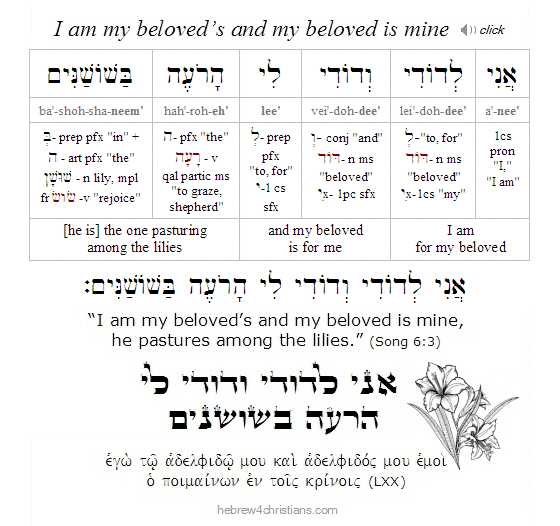|
The story of the Exodus from Egypt can be read as a great "Cinderella-like" love story. The beloved is imprisoned in far away castle, made to do the lowliest of labor, but the Lover soon appears and heroically rescues her from her distress. Together they run away to a land of promise, but they must traverse dangerous desert places, where the Lover protects and cares for his beloved. Eventually they pledge their undying love for one another and their married life begins...
Or so goes the story... But practically speaking, how would God - the Creator and LORD of all - "woo" a nation? What would such a courtship be like? How would the betrothed come to understand the Heavenly Bridegroom? For that matter, how would the betrothed come to understand herself?
Recall that after the LORD split the sea and led his people safely across, Israel sang a song of praise to Him. In Jewish tradition this is called Shirat Hayam, "the Song of the Sea," which is an "antiphon," or song of response to their deliverance from Egypt. In the Torah we read "Then Moses and the children of Israel sang this song to the LORD, and spoke, saying: "I will sing to the LORD, For He has triumphed gloriously! The horse and its rider He has thrown into the sea! The LORD is my strength and my song, and he has become my salvation; this is my God, and I will praise him, my father's God, and I will exalt him..." "Who is like you, O LORD, among the gods? Who is like you, majestic in holiness, awesome in glorious deeds, doing wonders? ... You have led in your steadfast love the people whom you have redeemed; you have guided them by your strength to your holy abode... You will bring them in and plant them on your own mountain, the place, O LORD, which you have made for your abode, the sanctuary, O Lord, which your hands have established" (see Exod. 15:1-21).
Note that the opening statement, "Then Moses and the children of Israel sang" is actually in the future tense: "Then they will sing" (אָז יָשִׁיר־מֹשֶׁה וּבְנֵי יִשְׂרָאֵל) which the sages say refers to the coming of Messiah. Indeed, in Revelation 15:3 we read that this song of Moses, as well as the song of the Lamb of God, will be sung in heavenly places: "They sing the song of Moses (שׁירַת מֹשֶׁה), the servant of God, and the song of the Lamb (שִׁירַת הַשֶּׂה), saying: "Great and marvelous are Your works, Lord God Almighty (יהוה אֱלֹהֵי צְבָאוֹת)! Just and true are Your ways, O King over the nations (מֶלֶךְ הַגּוֹיִם)" Note also that in the closing phrase of Shirat Hayam we read: יְהוָה יִמְלֹךְ לְעֹלָם וָעֶד - "the LORD will reign forever" (Exod. 15:18), but the word "will reign" (יִמְלךְ) is spelled with a missing letter Vav (ו), which suggests the Messiah our King Yeshua. The LORD will indeed reign when the rightful heir to the throne of David and the true King of Israel soon appears....
Going back to the "love story" analogy, at this point in their relationship, the betrothed knew the Divine Bridegroom in terms of His heroic deliverance and power, and even held hope of being led to His "holy abode" to dwell with Him... But how well did she know Him? Would she willingly give herself to Him because she truly loved and trusted Him, or would she merely submit because she was overawed or obliged by His power and glory? How could she learn her own heart, and how could God show her who she was meant to be?
In a word - testing... When God delivered Israel from Egypt, He did not take them on the fast track to the Promised Land (though He certainly could have done so). No, there was a circuitous route to take, a divinely appointed wandering, a Divine Stroll of betrothal, if you will. In order to reveal Himself to the Israelites, God had to led them directly into the desert. He embittered waters to make them sweet once again; He let stomachs growl to provide the Bread of life; He parched mouths to give Living Water from the "Rock that was struck" (1 Cor. 10:4). God did all this to reveal to his newly redeemed people that He is the satisfaction of all their longings... He rescued his bride from the house of slavery and now wanted to refine her to receive greater revelation to come. He was "wooing" or "courting" her in order to bring her beneath a canopy of stars at Sinai...
Hebrew Lesson
Song 6:3 Hebrew reading (click):
 |
|



